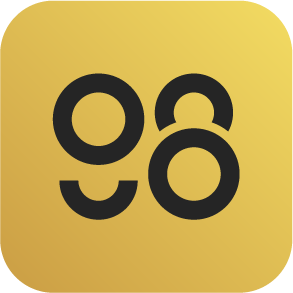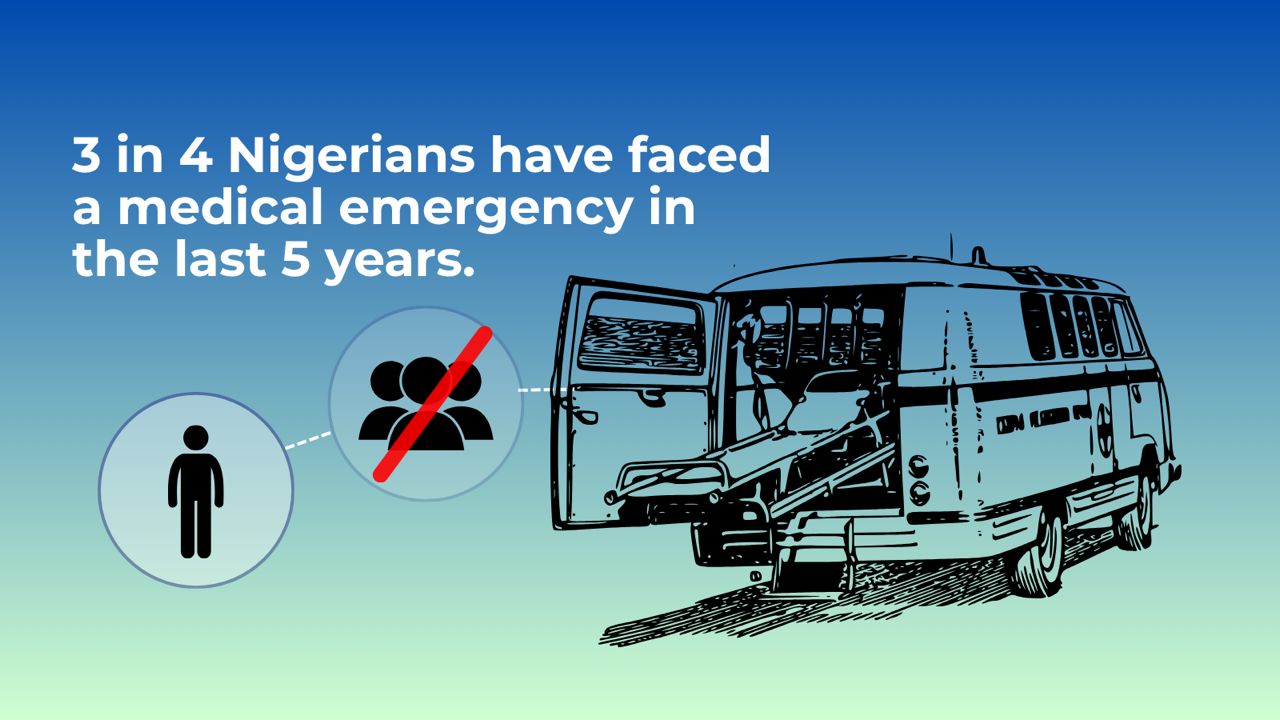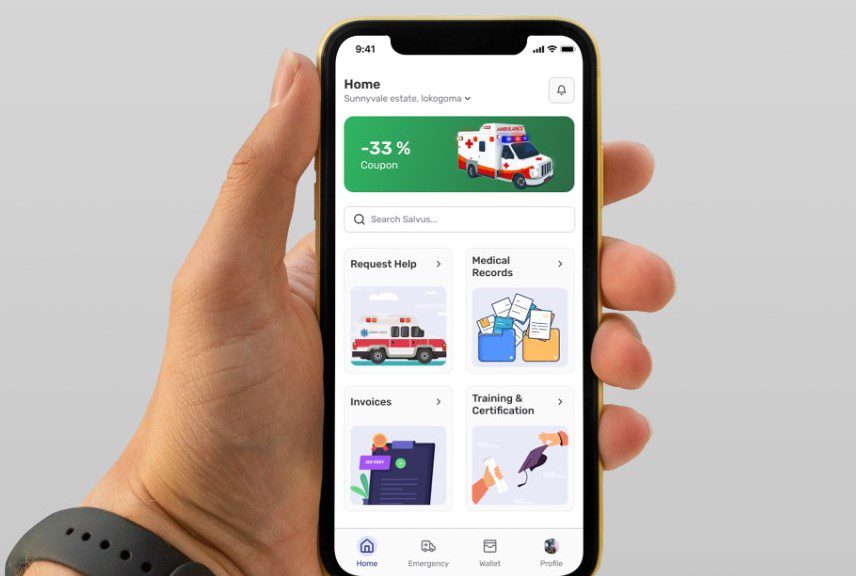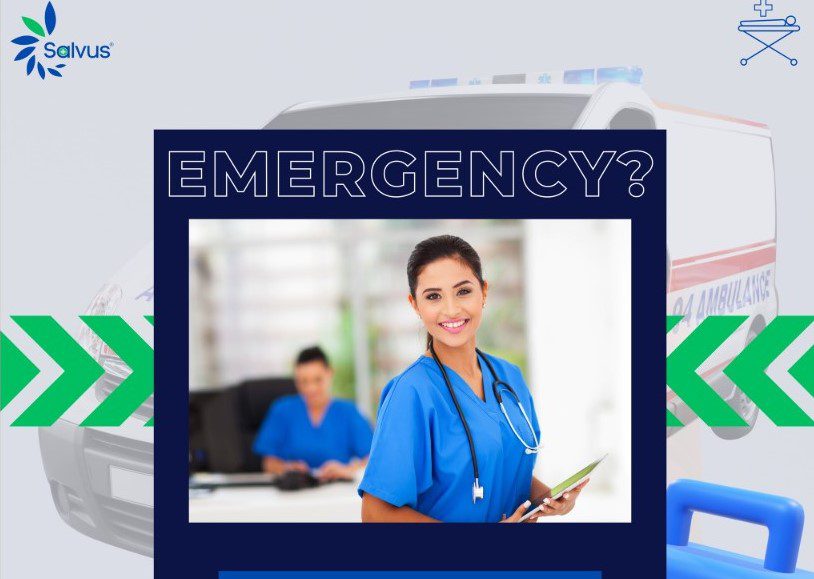







































How Salvus Emergency is repositioning Nigeria’s healthcare system with USSD dial and quick responsive care
 INSURANCE
INSURANCE
 WHEN
WHEN
 4
4
 FOUR
FOUR
 $DUBAI
$DUBAI
The Nigerian healthcare system is currently facing a critical challenge in its emergency service structure, and Salvus Emergency aims to address this with a rapid response network. This innovation, coupled with data-driven operations, is set to enhance the ability of ambulances to deliver timely care.
Nigeria is in a precarious status where only 2 in 100 people admitted for trauma or road accident emergencies receive pre-hospital care, meaning they are either brought in by Samaritans or onlookers. Sadly, 3 in 5 of these people die, which could have been prevented with a working emergency operation.
Amidst the health infrastructure crisis, Nigerians are faced with a high rate of emergency incidents. Data shows that 3 in 4 Nigerians have faced a medical emergency in the last 5 years.
Aside from unforeseen situations, most people are unsure of whom to contact when faced with a health crisis or delayed responses. Notably, these individuals are often unaware of their right to an ambulance in emergency cases.

While all this seems like every other negative data in the Nigerian healthcare system, Salvus wants to rewrite these stories by providing adequate pre-hospital care.
Launched in August 2024 and co-founded by Emmanuel Oziuwa-John, a second-generation health worker, and David Onoja, a medical doctor and clinical researcher, Lagos-based Salvus Emergency is providing a model to build Africa’s most reliable emergency response platform. With just a USSD dial or a few taps on the app, people are connected to an ambulance and to the right hospital.
In a conversation with Technext, the Chief Executive Officer, Emmanuel Oziuwa-John, explained that they have a system built with real-time mapped frames of every health facility. He added that its fleet of resourcefully built data has access to tell the available beds in specialist hospitals and medical centres.
“Through our data and the structure that we have built, we have seen that up to 30-40% of trauma updates can be preventable with our reduced response time. And we are building a tech-driven network that integrates the USSD, app and responder data,” he said.

As Salvus (Salvos in Greek) means salvation army or safety, the startup is working towards living up to that name. While emergency response time in Nigeria is estimated at an average of 45 minutes (5 times the global benchmark) and at worst time of 120 minutes, Salvus’ mission is to reduce that to the barest minimum from its end.
In the same light, it’s working like an Uber for ambulances and making sure every person is dispatched to the most precise hospital and not the one 60 minutes away. With an adequate pre-hospital care system, people in emergencies can get a seamless first aid system and be directed to the closest hospital that aligns with their case.
Also Read: How health and climate teams across Africa use Google’s Open Buildings data to improve society.
With a dial: How it works
In its operation, Salvus Emergency is partnered with health ministries and agencies, verified HMOs, responders and ambulance services.
By dialling the emergency code *752# or a few taps via the app, the system receives the alert and tries to understand the situation of the incident. Also, details about the person and possibly their health history are requested throughout the process. Emmanuel said the platform does this to align with the legal framework, and the whole idea is to determine how serious the case is.
If the case is a minor issue, a first responder is sent to attend to the situation. And if it’s a serious issue, an Ambulance is sent to the location as fast as possible, then transported to the closest and best medical centre for such a case.
“The whole point of this idea is to reduce time. We say in Salvus that every second matters; time reduction is a major thing. We want to instantly determine how serious the case is,” Emmanuel added.

Compared to the USSD method, where access to health history is impossible, frequent users on the Salvus app witness faster response time than the code dial. This is because the app keeps records and has users’ medical histories.
Notably, the service works in an end-to-end method. While Salvus offers quick service, people pay for the service rendered, and this works in various ways. The fee (N30,000) can either be incorporated into the hospital bill or paid directly.
It also has an emergency savings account feature that covers fees for unforeseen health cases that might arise. For instance, there’s a N5,000 per month plan framed in the form of a health insurance package. Emmanuel mentioned that Nigerians really do pay for health services, but just need a structure that ensures they get the quality of their service.
“We are trying to educate and encourage Nigerians to opt for health insurance. Once that is insured, it will be easier to get paid, and we’re directly dealing with the HMOs,” Emmanuel said.
The service doesn’t end there. Salvus also has a post-care structure that gets to check on users/clients after the person survives that emergency, or champions the health crisis.
The Nigerian wave
Across its efforts to refine Nigeria’s healthcare system in terms of having a quick and reliable emergency response time, Salvus is faced with difficulties hindering its reach and operation.
For instance, the CEO noted that the decision to provide adequate services in regions outside the South West is still hindered by gaps in data availability. However, he said work is in progress to partner with larger data-gathering agencies because the whole idea is not just for Lagos or the southwest, but for the whole of Nigeria.
“We’re mapping with this team as this team progresses. We’ll strike more partnerships with first responders, ambulance companies, hospitals, and trauma centres from state to state. It’s just harder right now to give people outside of the southwest this service. But I do think that in a couple of months, we will strike partnerships with data and research institutions that will help us to quickly scale into the other states,” Emmanuel said.

Another challenge is misinformation. This plays on the absence of realistic data that represents the real state of Nigeria’s healthcare system. And a possible case is the mismatch between the data available on paper and the data online. There’s also the issue of Nigerians misinforming themselves on drug usage, leading to its abuse.
To curb this negative trend, Salvus is going beyond providing a rapid response system to creating awareness that changes Nigerians’ orientation about health.
“We are currently shooting a lot of awareness videos, content, flyers, and targeting even the local media. We want Nigerians to know, this is what you do when you have this issue. Nigerians don’t know, and that’s our major challenge,” Emmanuel added.
Also Read: TikTok expands mental health education fund by $2.3M, Mentally Aware Nigeria among beneficiaries.
A look at Salvus’ 10-year plan
Beyond the ambulance service, Salvus has a ‘Safety as a Service’ offering, which is an on-site service for events and businesses where an ambulance and medical team are waiting in case of emergencies. The feature also incorporates training for employees and businesses on how to act in emergency cases.

In addition, the ‘Medical Visa by Salvus’ feature connects Nigerians to Dubai for treatment, vacation and pleasure. In its expansion plans, the company is adopting the ‘Emergency Savings Account’ feature that helps students and families prepare against unforeseen health circumstances.
While it’s still a work-in-progress, Salvus is working on getting investors and partnerships to fund its ideas. And it’s trying to raise over $100,000 in a pre-seed round.
The founders noted that they are open to partnering with private equity individuals and angel investors to accelerate their growth trajectory.

